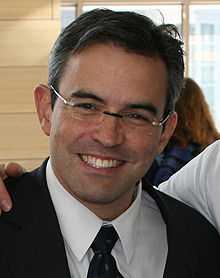Victor Montori

Victor M. Montori, (born, Lima, 1970), is Professor of Medicine at the Mayo Clinic in Rochester, Minnesota, USA. Montori was born and raised in Peru. He completed medical school at Universidad Peruana Cayetano Heredia in Peru, before joining the Internal Medicine Residency Program at the Mayo Clinic, where he was eventually named Chief Resident (1999–2000). Following his residency training, Dr. Montori began a Fellowship in Endocrinology, also at the Mayo Clinic, and obtained a Master degree in biomedical research from the Mayo Graduate School. During this training, Montori became interested in evidence-based medicine. He then spent two years at McMaster University in Canada, where he was a research fellow under Gordon Guyatt as a Mayo Foundation Scholar.
At the Mayo Clinic, Dr. Montori is currently a principal investigator of the Knowledge and Encounter Research (KER) Unit,[1] a multidisciplinary group of researchers focused on translating the best available research evidence into clinical practice through evidence synthesis (e.g., meta-analysis) and through enhancements in the patient-clinician encounter.
Dr. Montori is a recognized teacher of evidence-based medicine, promoting the ideals of incorporating the best available research evidence, the patient context, and the patient values and preferences in making clinical decisions.[2] He has been an active contributor to the Users’ Guides to the Medical Literature. His lecture on the End of Evidence-based Medicine [3] has brought his message that the corruption of research (e.g., through stopping clinical trials earlier than planned [4]) and the way doctors practice today (without taking into account the values, goals, expectations, and preferences of patients) is signaling the end of evidence-based medicine, and that the solution lies in using the techniques of evidence-based medicine to (a) assess how believable are the results of scientific studies, (b) how hyped are the results, (c) and how to apply those results to patients. He promotes an approach to research and practice that reclaims a commitment to the patient, promoting a patient revolution.
In that capacity, Dr. Montori won an American Diabetes Association Clinical Research Award [5] and has developed diabetes medication cards that can help patients with diabetes make better choices about their drugs.[6] In addition, he has promoted the measurement of patient important outcomes in diabetes trials [7][8] and a focus on cardiovascular risk reduction rather than glycemic control in the care of these patients with type 2 diabetes.[9]
The KER UNIT is involved in disseminating and implementing the GRADE Standard for guideline formulation and grading of recommendations in support of specialty medical societies like the Endocrine Society.[10] It also develops decision aids to help patients with chronic conditions, such as diabetes, and their clinicians make choices about therapies that are consistent with the best available research evidence and the goals for life and healthcare of the informed patient.
Dr. Montori also has served as director of research and education for the acclaimed SPARC Innovation Program at the Mayo Clinic, the first service R&D laboratory in healthcare.[11] In this capacity he is said to have the ability to cross "back and forth between design and research with fluency".[12]
Montori is recognized for promoting the practice of evidence-based medicine in endocrinology and diabetes care.[13] He has edited two volumes on the topic and has published more than 200 papers.[14] Montori also collaborated in the development of Minimally Disruptive Medicine and Normalization Process Theory.[15]
References
- ↑ http://kerunit.e-bm.org
- ↑ http://junkfoodscience.blogspot.com/2008/12/evidence-based-childhood-obesity.html
- ↑ http://videos.med.wisc.edu/presenter.php?speakerid=413
- ↑ http://www.acpinternist.org/archives/2009/01/trials.htm
- ↑ http://www.diabetes.org/diabetes-research/archive-meet-the-researcher.jsp
- ↑ Diabetes medication cards video demo
- ↑ http://pubs.ama-assn.org/media/2008j/0603.dtl#3
- ↑ http://blogs.wsj.com/health/2008/06/04/diabetes-studies-get-low-grades-on-issues-that-matter-to-patients/?mod=WSJBlog
- ↑ http://tip.org.pl/pamw/issue/article/216.html
- ↑ http://jcem.endojournals.org/cgi/content/abstract/93/3/666
- ↑ Salter C. A Prescription for Innovation
- ↑ Design for Health - Report for the VHA Foundation on Mayo Clinic SPARC Innovation Program
- ↑ Diabetics face risk on drug choices Rita Rubin, USA Today
- ↑ Mayo Faculty Research and Publications
- ↑ May C, Mair FS, Finch T, MacFarlane A, Dowrick C, Treweek S, et al. Development of a theory of implementation and integration: Normalization Process Theory. Implementation Science. 2009;4 art 29